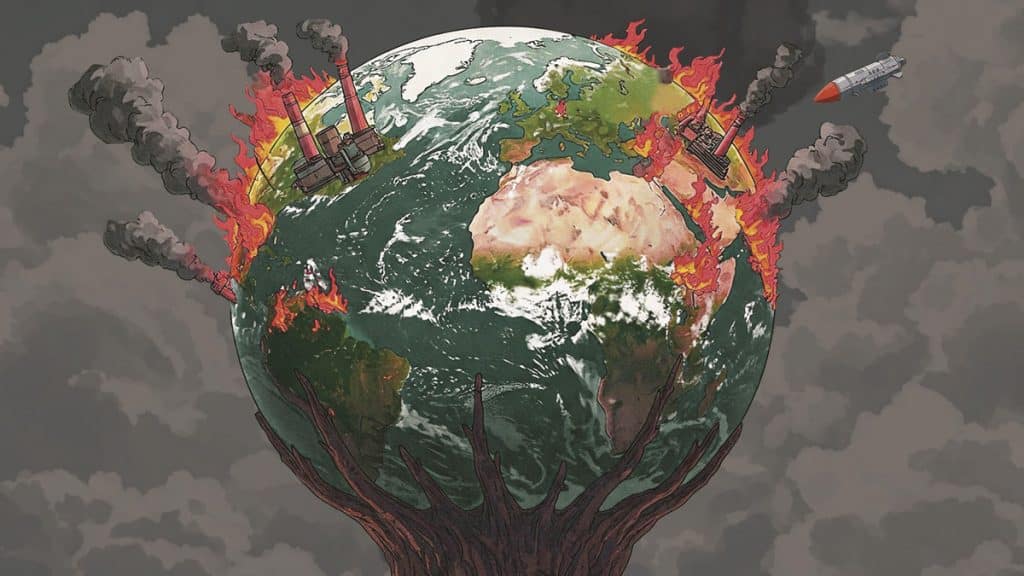Argentine Marxist Esteban Mercatante presents a groundbreaking “ecommunist” strategy in his new book, Fiery Red, offering a revolutionary alternative to the escalating multidimensional ecological crisis driven by capitalism. His work critically engages with prevailing ecological currents such as degrowth and ecomodernism, asserting that only a fundamental transformation of society’s relationship with nature, spearheaded by labor, can avert environmental disaster. Mercatante’s perspective emphasizes the systemic roots of the problem, advocating for a profound societal shift rather than superficial adjustments within existing frameworks, thereby contributing significantly to the Marxist theory of environmentalism.
Mercatante’s analysis highlights how capitalism inherently generates environmental degradation by treating ecological impacts as mere “externalities,” rather than integral costs. Traditional economic models fail to account for the true environmental burden, and attempts at “environmental governance” through taxes or carbon credits merely put a price on pollution without addressing the fundamental disconnect between capital accumulation and ecological sustainability. This systemic flaw ensures that the pursuit of profit relentlessly exacerbates the ecological crisis, underscoring the need for socialist solutions that transcend market-based mechanisms.
The book also dissects the insidious influence of denialist agendas and the false legitimacy gained by multilateral forums and corporate “greenwashing” efforts when attacked by anti-environmental forces. Such attacks, paradoxically, can normalize stagnant agendas, diverting attention from the urgent need for radical change. Mercatante cautions against the growing trend among some progressive sectors to defend these limited approaches, urging vigilance against strategies that merely perpetuate the underlying issues of environmental degradation without challenging the core capitalist logic.
A significant portion of Mercatante’s critique is directed at the degrowth movement, which identifies economic growth as the primary cause of the ecological crisis. While acknowledging the importance of questioning GDP as a measure of well-being, Mercatante argues that degrowth often veers towards critiquing consumption rather than production itself, thereby obscuring the systemic nature of the problem. Furthermore, he points out the movement’s struggle to articulate concrete alternatives beyond merely reducing the scale of production and consumption, often lacking a clear pathway for achieving a sustainable and equitable future, especially for dependent global South nations.
Conversely, ecomodernism, which posits technological acceleration as the answer, is presented as an almost mirror-opposite position. Mercatante critiques its fetishization of technology and the belief that innovation, once freed from capitalist constraints, can solve all environmental problems, even leading to a “fully automated luxury communism.” He exposes the inherent flaws in this techno-optimistic view, particularly its failure to address who controls and decides what is produced, and its tendency to conjure up fantastical solutions like space mining when earthly limits become apparent, offering a problematic environmental strategy.
Crucially, Mercatante argues that both degrowth and ecomodernism overlook the central role of labor as the agent of societal transformation. While both may discuss reducing the working day, they often miss the necessity of ending alienated relations between the producing class and the means of production. An ecommunist approach emphasizes expanding workers’ democracy and socializing the means of production, enabling collective decision-making about what is produced and consumed, thereby re-establishing a genuine unity between these processes based on social needs rather than profit motives.
This Marxist theory of ecommunism is not a magic bullet but a sober proposal for confronting the ecological disaster inherited from capitalism. By achieving new relations of production founded on democratic deliberation among workers and communities, and through planned social production based on the socialisation of productive assets, society can overcome the polarised “more” or “less” debate among ecosocialists. This approach promises to establish a balanced social metabolism while simultaneously satisfying collective social needs, charting a realistic and transformative path forward for environmentalism.





Leave a Reply